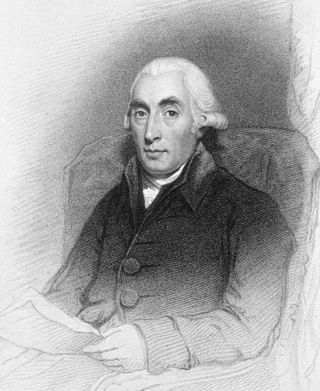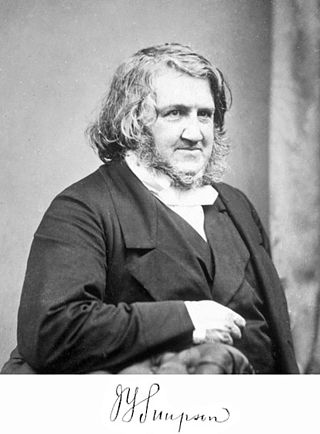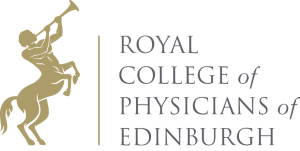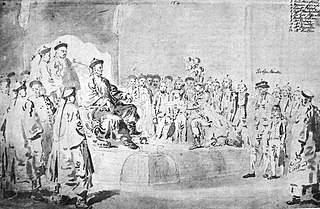Related Research Articles

William Cullen FRS FRSE FRCPE FPSG was a Scottish physician, chemist and agriculturalist, and professor at the Edinburgh Medical School. Cullen was a central figure in the Scottish Enlightenment: He was David Hume's physician, and was friends with Joseph Black, Henry Home, Adam Ferguson, John Millar, and Adam Smith, among others.

George McCartney, 1st Earl McCartney, also spelt Macartney, was an Anglo-Irish statesman, colonial administrator and diplomat who served as the governor of Grenada, Madras and the British-occupied Cape Colony. He is often remembered for his observation following Britain's victory in the Seven Years' War and subsequent territorial expansion at the Treaty of Paris that Britain now controlled "a vast Empire, on which the sun never sets".

Joseph Black was a Scottish physicist and chemist, known for his discoveries of magnesium, latent heat, specific heat, and carbon dioxide. He was Professor of Anatomy and Chemistry at the University of Glasgow for 10 years from 1756, and then Professor of Medicine and Chemistry at the University of Edinburgh from 1766, teaching and lecturing there for more than 30 years.

The history of alternative medicine refers to the history of a group of diverse medical practices that were collectively promoted as "alternative medicine" beginning in the 1970s, to the collection of individual histories of members of that group, or to the history of western medical practices that were labeled "irregular practices" by the western medical establishment. It includes the histories of complementary medicine and of integrative medicine. "Alternative medicine" is a loosely defined and very diverse set of products, practices, and theories that are perceived by its users to have the healing effects of medicine, but do not originate from evidence gathered using the scientific method, are not part of biomedicine, or are contradicted by scientific evidence or established science. "Biomedicine" is that part of medical science that applies principles of anatomy, physics, chemistry, biology, physiology, and other natural sciences to clinical practice, using scientific methods to establish the effectiveness of that practice.

Sir Gilbert Blane of Blanefield, 1st Baronet FRSE FRS MRCP was a Scottish physician who instituted health reform in the Royal Navy. He saw action against both the French and Spanish fleets, and later served as a Commissioner on the Sick and Wounded Board of the Admiralty.

HMS Lion was a 64-gun third-rate ship of the line of the Royal Navy, of the Worcester class, launched on 3 September 1777 at Portsmouth Dockyard.

Sir James Young Simpson, 1st Baronet, was a Scottish obstetrician and a significant figure in the history of medicine. He was the first physician to demonstrate the anaesthetic properties of chloroform on humans and helped to popularise its use in medicine.

The Royal College of Physicians of Edinburgh (RCPE) is a medical royal college in Scotland. It is one of three organisations that sets the specialty training standards for physicians in the United Kingdom. It was established by Royal charter in 1681. The college claims to have 12,000 fellows and members worldwide.

Thomas Beddoes was an English physician and scientific writer. He was born in Shifnal, Shropshire and died in Bristol fifteen years after opening his medical practice there. He was a reforming practitioner and teacher of medicine, and an associate of leading scientific figures. He worked to treat tuberculosis.

Sir George Leonard Staunton, 1st Baronet was an Irish botanist who was an employee of the British East India Company.

John Sims was an English physician and botanist. He was born in Canterbury, Kent and was subsequently educated at the Quaker school in Burford, Oxfordshire, he then went on to study medicine at Edinburgh University. Later in life he moved to London (1766) where he worked as a physician, notably he was involved with the birth of Princess Charlotte in which both mother and baby died. He was the first editor of Curtis's Botanical Magazine.

Admiral Sir Erasmus Gower was a Welsh naval officer and colonial governor.

The Macartney Embassy, also called the Macartney Mission, was the first British diplomatic mission to China, which took place in 1793. It is named for its leader, George Macartney, Great Britain's first envoy to China. The goals of the mission included the opening of new ports for British trade in China, the establishment of a permanent embassy in Beijing, the cession of a small island for British use along China's coast, and the relaxation of trade restrictions on British merchants in Guangzhou (Canton). Macartney's delegation met with the Qianlong Emperor, who rejected all of the British requests. Although the mission failed to achieve its official objectives, it was later noted for the extensive cultural, political, and geographical observations its participants recorded in China and brought back to Europe.
Events from the year 1793 in Great Britain.

Sylvester Douglas, 1st Baron Glenbervie, PC, KC, FRS, FRSE, FSA was a British lawyer, politician and diarist. He was Chief Secretary for Ireland between 1793 and 1794.

James Macartney was an anatomist. He began life as an Irish volunteer in 1780, and was afterwards educated at the endowed classical school at Armagh, and then at a private school. He was associated for a time with the Sheares brothers and Lord Edward Fitzgerald, the United Irishmen but, being dissatisfied with their programme, he cut himself adrift and began to study medicine.
Dr Thomas Spens FRSE (1764–1842) was an 18th/19th century Scottish physician who served as President of the Royal College of Physicians of Edinburgh from 1803 to 1806.

An outbreak of smallpox in Bradford in 1962 first came to attention on 11 January 1962, when a cook from the children's hospital in Bradford, West Riding of Yorkshire, England, presented with an unexplained fever and was found to have changes in her blood similar to another sick person at the nearby St Luke's Hospital, both samples appearing compatible with smallpox. The index case was later discovered to be a nine-year old girl who arrived in the UK on 16 December 1961 from Karachi, Pakistan, where there was an ongoing epidemic of smallpox.

Whitley Stokes (1763–1845) was an eminent Irish physician and polymath. A one-time United Irishman, in 1798 he was sanctioned by Trinity College Dublin for his alleged republicanism. In 1821, he published a rebuttal of Robert Malthus's thesis that, as spurs to population growth, in Ireland attempts to improve the general welfare are self-defeating. The country's problem, Stokes argued, was not her "numbers" but her indifferent government.

Alfred Berthier Olsen was an American physician, Seventh-day Adventist and vegetarian.
References
- 1 2 Hugh Gillan entry on the Royal College of Physicians website
- ↑ Bivins, Roberta (1 December 1999). "Expectations and Expertise: Early British Responses to Chinese Medicine". History of Science . 37 (4): 459–489. doi:10.1177/007327539903700404. S2CID 162745173.
- ↑ Hugh Gillan entry on the Royal Society website